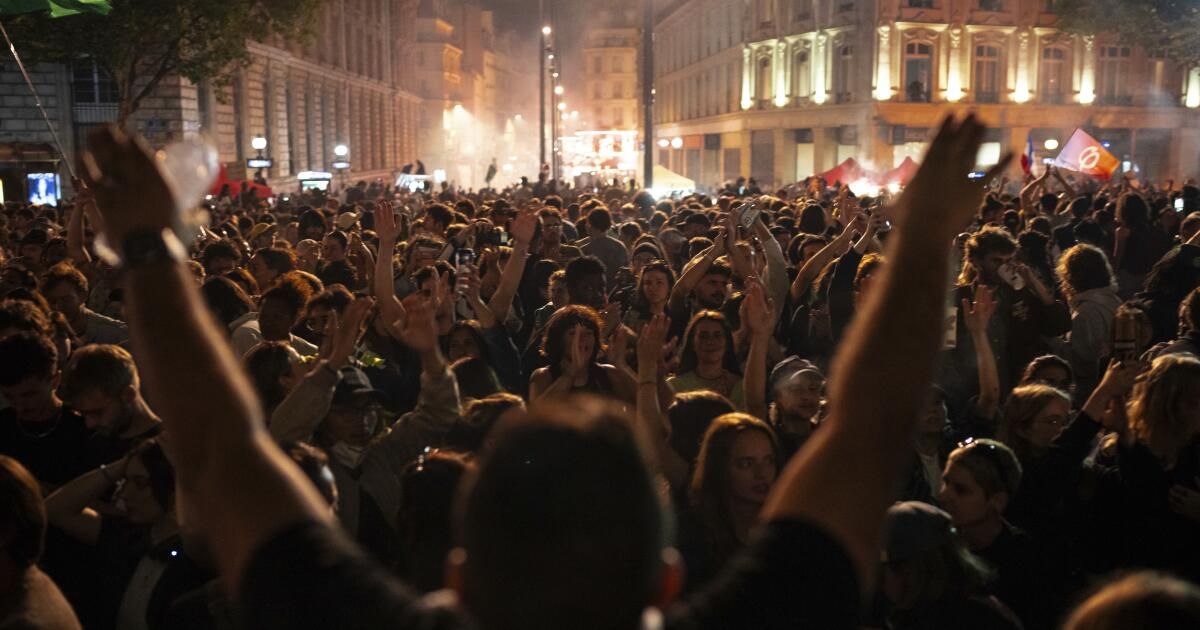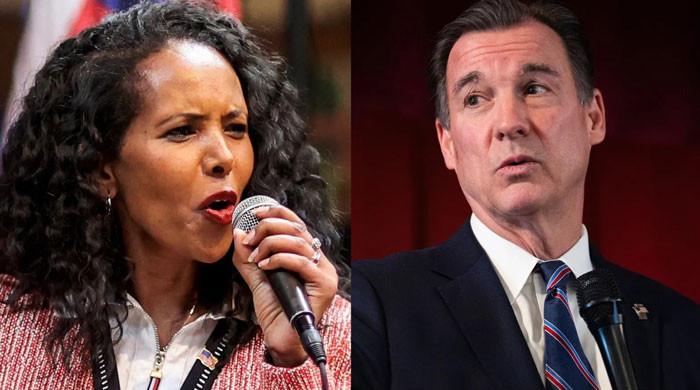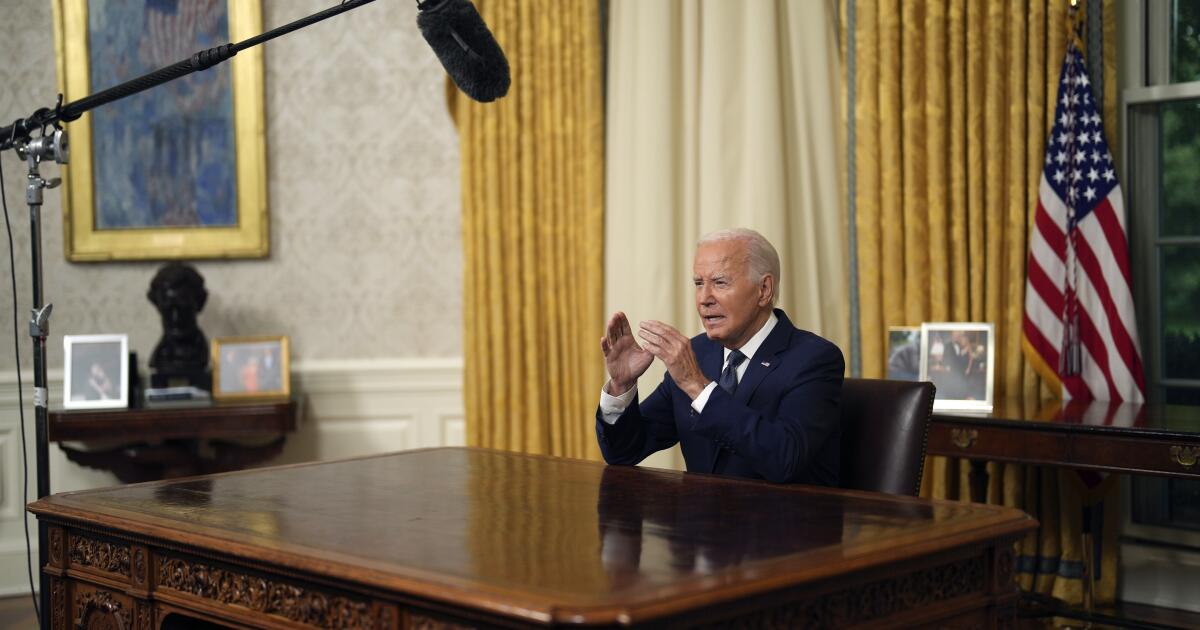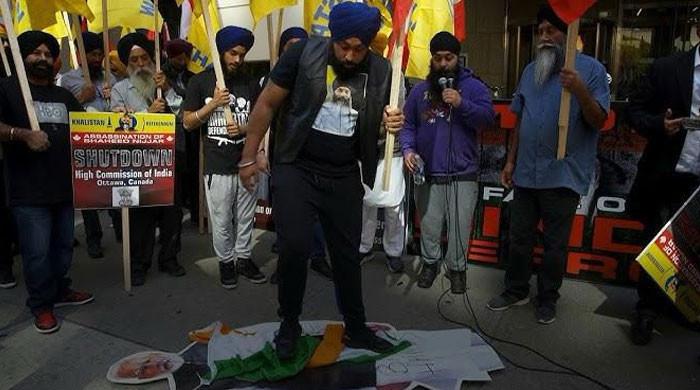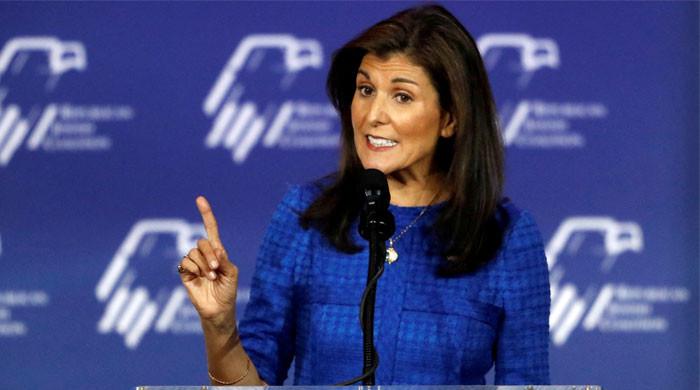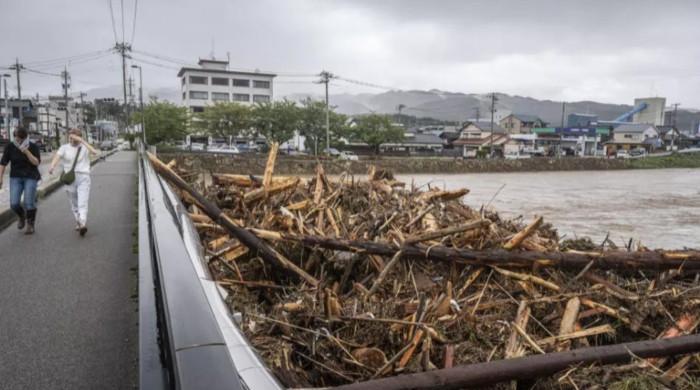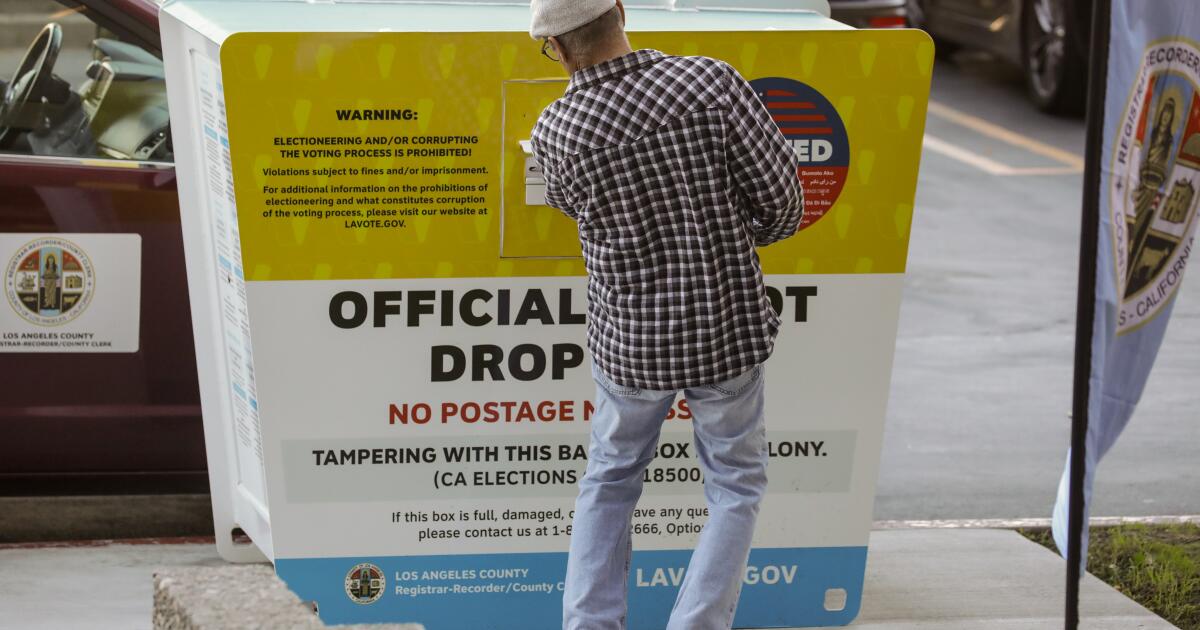In Parisian cafés, strangers made joyful toasts. In the crowded crowds, people hugged and cried. A cyclist sped along behind the waving French tricolor flag. Fireworks whistled and popped.
In Sunday's parliamentary elections, France's far right dealt a thunderous blow to the doors of power, a blow that was apparently reduced at the last moment to an insistent knocking.
The National Rally, whose rise had been widely feared after topping the list in the first round of voting a week earlier, fell to third place, while vote counts indicated a divided parliament, with no bloc achieving a clear majority.
The uncertainty of what lay ahead was not lost on those attending the celebrations in Paris, but for the moment they were delighted that voters had dispelled what had been the spectre of France's first far-right government since the dark days of Nazi collaboration in World War II.
People celebrate the election results in Paris on July 7, 2024.
(Aurelien Morissard/Associated Press)
The new coalition of leftist and environmentalist forces was the surprise of the night, seen as having won the most parliamentary seats, ahead of President Emmanuel Macron's centrists. A final official tally was not expected until later on Monday.
“C'est Ouf,” was the headline on Monday’s first edition of the leftist newspaper Liberation — madness, in slang terms — superimposed on a photo of a giant gathering in the Place de la Republique, a historic square in central Paris.
The political chaos comes less than three weeks before the start of the Summer Olympics, though visitors to Paris are unlikely to experience much disruption beyond the obstacle course that already exists in the city center.
On election day, many of the tourists making their way through the barricades and blockades knew nothing about the vote or had only heard about it in very vague terms.
But for the French, the fighting was very intense.
Until the early hours of Monday morning, long after the last light of the late summer evening had left the sky, there was widespread rejoicing, but there was already a sense of stagnation and instability that will almost certainly follow the split result.
“I guess you could say they ‘dodged a bullet,’ right?” said Leslie Laurent, a Parisian retail manager in her 50s. She said she had supported Macron’s bloc but was relieved the far right had not scored a decisive victory.
The stakes of the vote were reflected in unusually high tensions surrounding the race and a turnout that officials described as the highest in decades for a parliamentary contest.
The government sent 30,000 police officers onto the streets on election day and dozens of candidates reported being physically assaulted in the run-up to the vote.
Macron, whose term does not expire until 2027, can remain in office, although some opponents have already called for his resignation.
His hand-picked prime minister, Gabriel Attal, announced almost immediately after the first solid projections were published that he would resign, although Attal left open the possibility of staying in his post until a new government can be formed, which could be a long and difficult process.
The National Rally — a successor party to the xenophobic National Front that for decades was relegated to France's political periphery — had high hopes for the vote and expressed confidence that it could even win an absolute majority and form a government.
But although it fell far short of that goal, the National Rally did dramatically increase its number of parliamentary seats, a development that is likely to result in considerable regret once the initial euphoria passes.
And, of course, not everyone is happy.
The National Rally earned its name from its deep antipathy toward immigration and contempt for the European Union, but part of its appeal stems from a deep dissatisfaction with the cost of living and economic inequalities within France — sentiments shared even by many who felt that voting for the party would be an affront to France's democratic values.
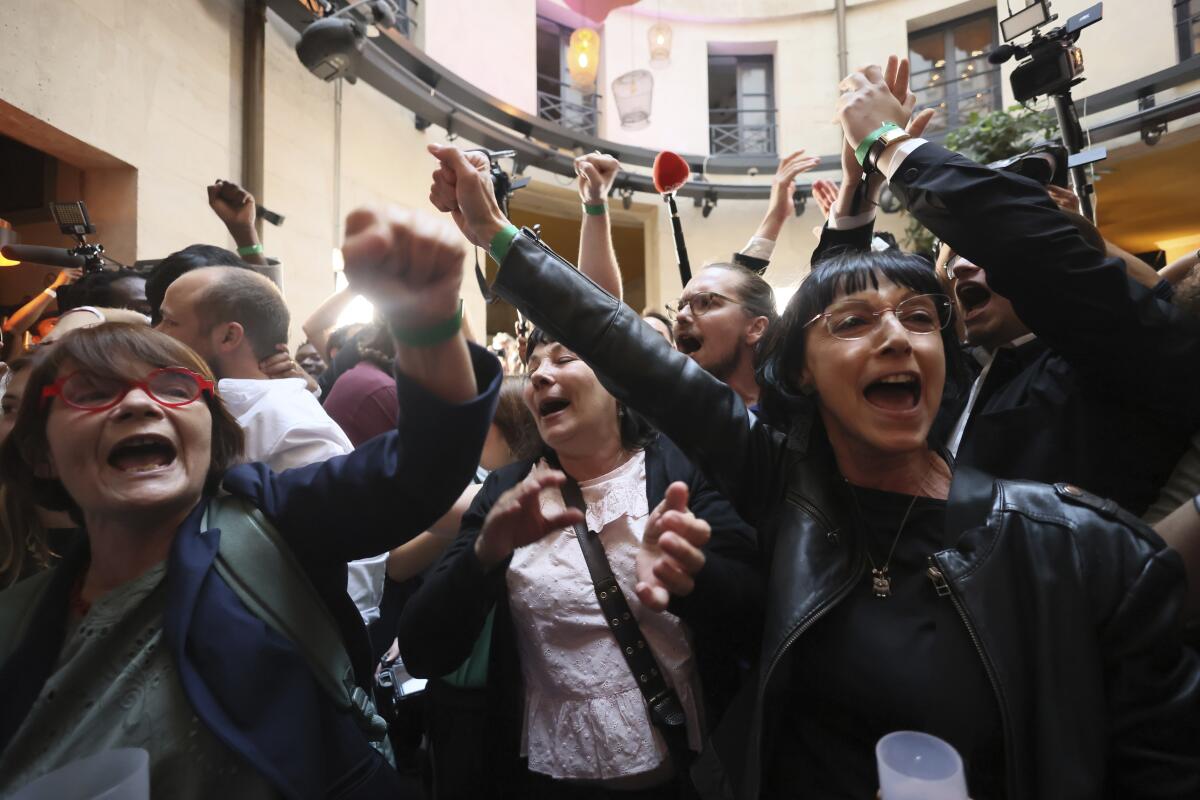
Supporters of the far-left party Unbreakable France react in Paris as a left-wing coalition won a majority of parliamentary seats in early elections.
(Thomas Padilla/Associated Press)
The initial reaction from Macron’s camp was subdued. The leader did not make an immediate personal appearance, but his office said he would ensure that “the sovereign choice of the French people is respected.”
Following the first round of elections on 30 June, in which the National Rally came first (which in turn followed the elections on 9 June in France for the European Parliament, in which the National Rally also came first), centrist and leftist forces joined together, as they have done in the past, to create a “republican front”.
This seemingly military effort is so called because it was intended to safeguard the French Republic by blocking the far-right giant.
The far right responded to the initial results with defiance. Its president, Jordan Bardella, 28, who had hoped to become the next prime minister, spoke sadly of “dangerous electoral deals” made to hinder the National Rally’s advance.
Leaning on the party’s narrative that it defends the forgotten against a powerful elite, Bardella told supporters in Paris that these machinations had “deprived” National Rally supporters of the government they wanted.
Calling an early election had been a big gamble by Macron, and there were mixed opinions about whether he had won or not. He had counted on French voters to reject the National Rally as a governing force, even if they were prepared to give him a protest vote.
Still, the battle was deeply damaging and will likely leave Macron, deprived of a parliamentary plurality, as a diminished figure in global affairs, including causes such as defending Ukraine and combating climate change.
During the campaign, Macron described the far left as as dangerous as the far right, a dynamic of enmity that will make it difficult for his centrists to secure even temporary tactical alliances with leftists.
At least at this point, none of the main blocs seemed willing to work together, and the successful left-wing group in particular could be prone to infighting.
Marine Le Pen, the leader of the National Rally who did not take part in this election but is expected to run in the 2027 presidential election, suggested in a television interview after the vote that it took the combined efforts of the left and the centre to keep her party down.
In the setbacks of the night, he told French broadcaster TF1, he saw “the ferments that are those of tomorrow's victory.”
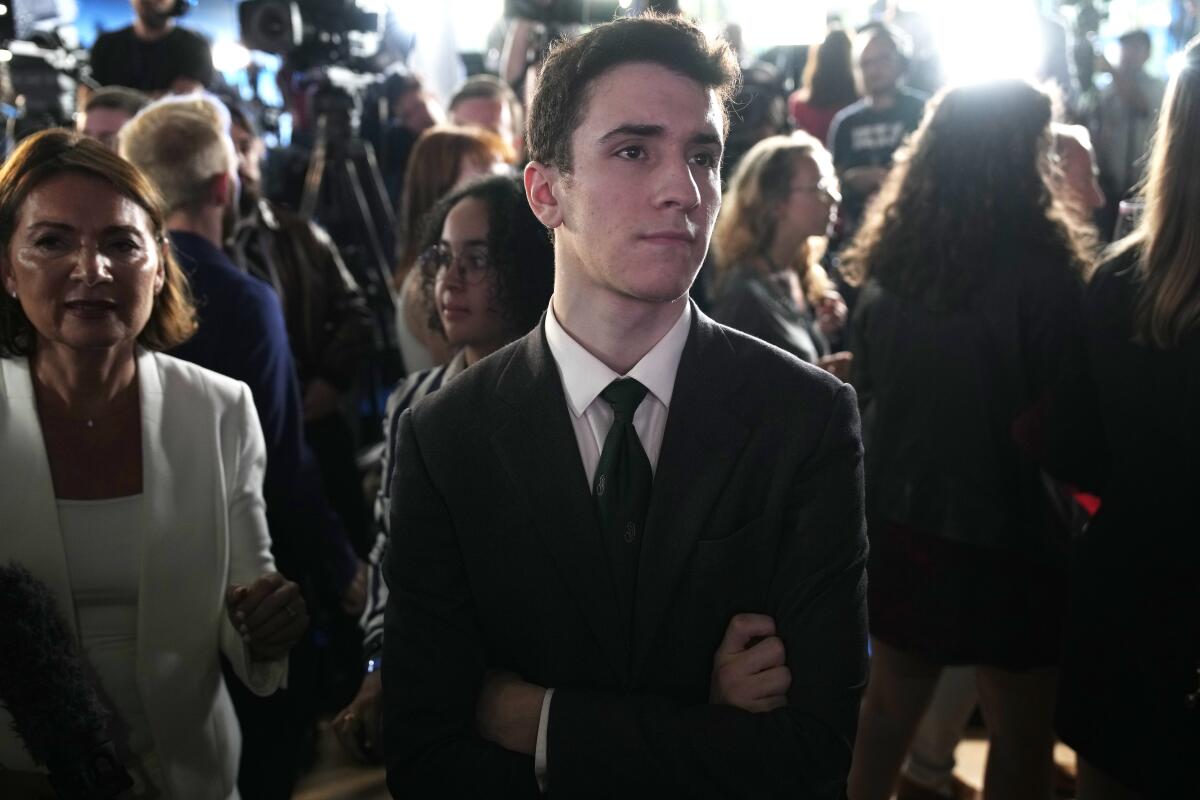
Supporters of the far-right National Rally party react at their headquarters in Paris after the publication of voting projections indicating the party would come third.
(Louise Delmotte/Associated Press)

